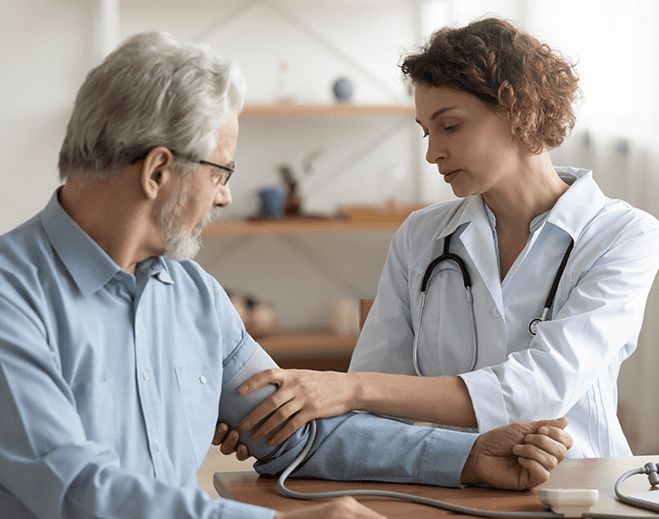Cardiac Care
Whether you’re looking for cardiovascular disease treatment, diagnosis or rehabilitation services, Piedmont Medical Center can help. Our team of board-certified cardiologists, cardiothoracic surgeons and other cardiac health specialists work relentlessly to provide comprehensive cardiac care services to our patients.
Comprehensive Cardiac Care at Our Heart and Vascular Center
Cardiovascular disease is an umbrella term for all types of conditions that affect the heart or blood vessels, while heart disease is a condition that affects the heart's structure and function. According to the Centers for Disease Control and Prevention (CDC), heart disease is the leading cause of death in the United States. Cardiovascular disease kills one person every 34 seconds.
At Piedmont Medical Center, we encourage you to learn more about your heart health, healthy lifestyle and our role in helping you do both. Becoming more informed is a major part of protecting your or your loved one’s heart. Expect comprehensive heart care services at our Heart and Vascular Center.
We maintain a dedicated cardiovascular intensive care unit (CV-ICU), catheterization lab and cardiovascular/telemetry unit to fulfill the advanced cardiac needs of our patients. We provide appropriate diagnostic, therapeutic and surgical services for a wide range of heart diseases, including:
- Advanced diagnostics and electrophysiology
- Heart disease prevention
- Medical therapy
- Minimally invasive surgical treatment
- Open-heart surgeries
What Is Cardiac Care
Cardiac care is all about taking care of your heart through healthy practices associated with fitness, nutrition and stress management. Although you can get started with any of these to protect your heart, a visit with a cardiologist can confirm your heart’s condition.
Some cardiovascular diseases come without warning. A cardiologist may be able to discover a heart problem early through diagnostic exams for a more comprehensive heart check. Our cardiologists use the following procedures for cardiovascular disease diagnosis:
- Arterial vascular study lower extremity – a noninvasive diagnostic procedure that compares the lower limb’s blood pressure to the upper limb’s
- Dobutamine stress test with echocardiography imaging or nuclear imaging – in this test, dobutamine is used to artificially make the heart beat faster so that its performance can be accurately assessed under stress
- Echocardiogram – uses sound waves to create photos of the heart
- Electrocardiogram (ECG) – records the heart’s electrical activity
- Exercise stress test – also known as exercise test or treadmill test, an exercise stress test is used to see how well the heart performs during physical activity
- Lexiscan stress test – used for people who cannot exercise for very long or are unable to exercise. Lexiscan medication is injected into patients to dilate their coronary arteries and increase their blood flow. It can help heart doctors identify obstructions in the heart’s arteries
- Transesophageal echocardiogram (TEE) - uses echocardiography to evaluate the function and structure of the heart
How Do You Know If You Have Heart Problems?
Some people may not be aware they have cardiovascular disease until they experience symptoms or signs of stroke, heart attack, arrhythmia or heart failure. If you experience any of these symptoms or observe them in your loved ones, seek medical care immediately:
- Pain or discomfort in the middle of the chest
- Pain or discomfort in the arms, elbows, the left shoulder, back or jaw
- Confusion
- Difficulty speaking or understanding speech
- Lightheadedness
- Loss of vision in one or both eyes
- Loss of balance
- Nausea or vomiting
- Numbness of the arm or leg, face, especially on one side of the body
- Severe headache with no known cause
- Shortness of breath
Why Is Cardiac Care Important?
Patients undergoing treatment for cardiac disease need extra care and attention. Our fulfillment is seeing our patients regain the strength to help them get back to doing what they love. As such, our Heart and Vascular Center has a chapter of Mended Hearts, a nationwide network that offers support to cardiac patients and their caregivers.
Members of Mended Hearts regularly visit Piedmont Medical Center to offer some support and add a little sunshine to the lives of patients combating cardiac diseases. Our patients can access exceptional cardiovascular services and fellowship-trained, board-certified heart specialists. Our team of cardiologists and vascular surgeons work tirelessly to ensure that you receive superior cardiovascular services, such as:
- Atrial fibrillation ablation – a special wire or catheter is used to destroy and block the abnormal signals originating from the pulmonary veins
- Electrophysiology studies and ablations – a special catheter is used to assess and treat abnormal signals in the heart chambers
- Angioplasty – a balloon catheter is inserted in the blocked coronary artery to widen it and improve blood flow to the heart
- Artificial heart valve surgery – the diseased heart valve will be repaired or replaced with artificial valves made of an animal valve or a manufactured valve
- Atherectomy – aims to remove plaque clogging an artery
- Bypass surgery – wherein a surgeon uses blood vessels taken from other parts of your body to bypass the damaged arteries
- Cardiothoracic surgery – refers to the surgical treatment of the organs within the thoracic cavity, which includes the lungs, heart and other mediastinal or pleural structures
- Implantable cardiac devices – these are usually recommended as an intervention for patients who have abnormal heart rhythms
- Minimally invasive heart surgery – a surgeon makes a small incision on the right side of the chest to reach the heart through the ribs
- Stent procedure – often used in conjunction with angioplasty, stent procedure involves installing a wire mesh tube into a narrowed artery to keep it open
- Vascular surgery – surgical treatment that focuses on treating the vascular system or the veins, arteries and lymphatic system
Here are the other heart procedures we perform at Piedmont Medical Center:
- Aortic root replacement
- Aortic surgery
- Atrial myxoma resection
- Atrial septal defect repair
- Carotid endarterectomy
- Foramen ovale repair
- Minimally invasive aortic valve replacement
- Minimally invasive mitral valve repair or replacement
- Pacemaker lead extraction
- Pericardiectomy
- Repair aortic aneurysm/dissection (ascending and descending)
- Repair ventricular aneurysm
- Robotic thoracic surgery
- Thoracic endoscopy
- Thoracic surgery
- Thoracotomy
- Valve repair/replacement
- Ventricular septal defect repair
- Video-assisted thoracic surgery





